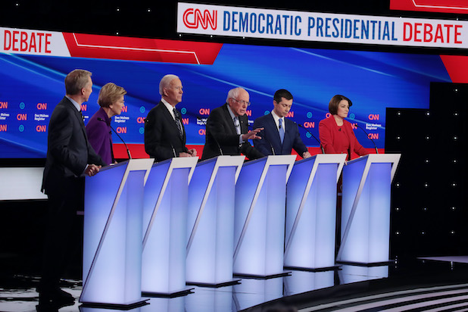White Democratic Candidates Qualified for the Democratic Debates… Again.

Courtesy of Getty Images
By Katie Hoban
For the first time in the current presidential election season, no person of color qualified for the most recent Democratic primary debate, held on January 14th at Drake University in Des Moines, Iowa. The party’s inclusive identity is under heavy fire from both political opponents and Democratic party members after only white candidates met the requirements to qualify for the seventh Democratic debate.
The group of candidates at the start of the 2020 campaign trail were the most diverse group in the nation’s history (Washington Post). Notable contenders at the beginning of the campaign trail, such as Senators Cory Booker of New Jersey and Kamala Harris of California, ended their campaigns in recent months due to lack of funding and support. Businessman Andrew Yang received a great deal of support from the Democratic party, however low polling numbers and low campaign donations did not qualify Mr. Yang to make it to the debate stage. Candidates needed to have at least 5% support in the early state polls, consisting of Iowa, New Hampshire, Nevada, and South Carolina or at least 7% support in two early state polls by January 10th (ABC).
The lack of diversity in the debate created a great deal of controversy, considering minorities are the most loyal base to the Democratic Party. According to Democratic strategist Jess Morales Rocketto, the party needs to address the systemic barriers that exist for minority candidates (CNN).
“It’s not on the party to solve racism or sexism,” Rocketto said to CNN, “but it is on them to make sure they address systemic barriers for non-white candidates.”
The lack of diversity is a growing concern amongst those voting to push President Donald Trump out of office. According to a study conducted by Gallup, the Republican party’s racial diversity has decreased over recent years, with approximately nine in every ten republicans being white, a stark contrast from the demographics of the Democratic party.
CUA College Democrat, Sophia Marsden, also spoke to the lack of diversity on the debate stage as well.
“It is a reflection of the systematic, economic, and racial problems we face as a country” said Marsden, the media coordinator for CUA College Dems, “Different privileges due to their gender race and economic status. It just shows how much work we have to do as a country.
Trump’s exclusive rhetoric towards minorities in recent years is argued to have led to the ostracism of immigrants, women, and other minorities, causing an uproar in the Democratic party.
In response to President Trump’s actions while in office, such as offensive rhetoric towards the Hispanic community, many Democrats have looked toward a diverse group of candidates for the Democratic nomination.
The Collective PAC is a political action committee working to get African American politicians elected. Quentin Jones, the founder of The Collective PAC, told ABC News that the lack of diversity is “unfortunate” but still has hope for a diverse debate in the future (ABC).
“There is no way in hell the Democratic party can win in 2020 without having a person of color on the ticket,” Jones said. “And while I’d love to see a diverse debate stage, it’s not necessarily indicative of where voters are and where the ticket will end up in July at the DNC [Democratic National Committee] convention.”
The lack of diversity leaves the question of whether or not qualifying standards are fair or even reasonable to meet.
The DNC increased qualifying criteria throughout the campaign process and instilled grassroot voting requirements in order to make it to the debate stage. Adrienne Watson, Deputy Communications Director of the DNC, defended the DNC’s qualifying process and thresholds.
“The DNC has been more than inclusive throughout this entire process with an expansive list of qualifying polls,” Watson said. The next Democratic debate is being held at St. Anselm College in Manchester, New Hampshire on February 7th, 2020. The rules have yet again changed. This time, candidates only need one voter pledge, where one pledges to vote for a specific candidate. The DNC is planning on doing this in order to get a bigger voter turnout for this upcoming election (The Hill).








